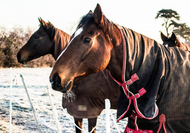When it comes to our horses’ comfort we obviously want nothing but the best for them. It’s logical, therefore, that when Autumn sets in and the weather becomes chilly, we find ourselves shivering and conclude that our horses are cold too.
Time to break out their rugs and our winter coats!
When and how much to rug horses, however, is one of the most confusing decisions a horse owner has to make. Perhaps you’ve seen those recent headlines in the equestrian media telling us that over-rugging is a welfare issue? There’s a danger of being cruel in our desire to be kind.
So when are rugs necessary – if at all?
Thermoregulation
Of course when deciding to rug or not to rug a lot depends on the individual horse and his circumstances. As a starting point, though, it helps to understand that horses have an inbuilt ability called thermoregulation which enables them to adapt to temperature variations.
Our equine friends adapt to cold by using thermogenesis (producing heat) or by thermolysis (loss of heat), using physiological mechanisms involving the skin, muscles, fat and hair.
As we all know when autumn sets in horses – particularly those who are usually outside – grow a thicker, longer coat to compensate for the colder weather.
Some of the other mechanisms involved in keeping their bodies warm may well be interpreted by us humans as signs of discomfort and being too cold. Things like shivers, for example, which is actually a reflexive muscle contraction to produce heat from metabolising sugars and fatty acids. Then the hair may bristle and stand on end, to create an insulating effect – which obviously doesn’t work if the horse’s coat is soaked by rain.
In the cold the blood vessels in the extremities of a horse’s limbs will also constrict, to ensure most blood flows to the central organs and the horse’s feet don’t suffer tissue damage if their feet are on the cold ground or in the snow.
In the cold you may also notice that your horse breathes more slowly – a lower respiratory rate reduces heat loss by evaporation. The adrenal glands will also release more adrenaline to send glycogen to fuel up the muscles.
When is cold too cold?
So we understand that horses are naturally able to compensate for the cold – which explains why our native breeds survive the winters happily out on the moors – but does cold weather reach a point when even our cleverly designed horses can’t hold out against the elements? Then when must also consider that our modern domesticated horses of various breeds are “spoilt” in being cared for and protected so assiduously, so their natural ability to fend off the cold may be compromised.
Things like clipping and frequent grooming (which removes the natural oils from the coat) inhibit horses’ ability to cope with the cold, just like those with limited turn out who live in unnatural environments. Then there are horses who routinely wear sweet-itch rugs in warm weather, or protective sheets for showing, competing and travelling.
There may well be a case for rugging horses in these situations when temperatures plummet to zero or below. The tricky question is, however, what weight of rug to use.
Appropriate Rug Weights
As we have said, a lot depends on the circumstances in which the individual horse is kept. To assist you in your choice however we rather like this rugging guide produced by Equus (English equestrian riding apparel suppliers).
Please note that this is a guide only … you are advised to use your discretion and avoid over-rugging your horse!
Consequences of Over-Rugging Horses
A horse that is over-rugged during winter will end up obese by spring, putting him at risk of laminitis. Horses should gain weight during summer and lose it in the winter, burning calories for thermoregulation.
- An over-rugged horse might display signs of colic, but in fact they are suffering heatstroke.
- Over-rugging definitely compromises the horse’s thermoregulatory ability.
- Rugs interfere with the horse’s natural proclivity for mutual grooming and can lead to various skin conditions.
We’re not saying don’t rug at all … just consider what is best for your individual horse and his environmental conditions.
One other thing to consider, if you don’t rug you shouldn’t just jump on a cold horse first thing in the morning to ride away …. Like all athletes he needs a warm up!
We sell horse rugs from our shop in Frome, Somerset and are happy to advise on the best make, model and weight for your horse. Keep your horse happy and healthy this winter!



